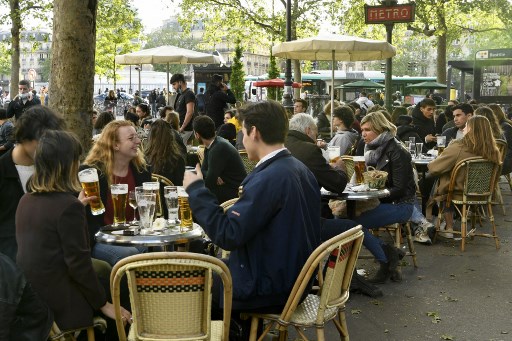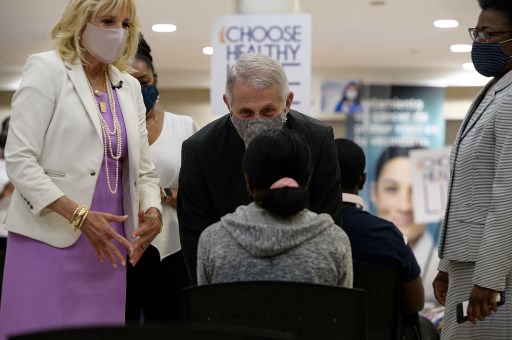
Cafes and restaurants with terraces or rooftop gardens can now offer outdoor dining, under the second phase of a lockdown-lifting plan that should culminate in a full reopening of the economy on June 30. (Photo by Bertrand GUAY / AFP)
by AFP Bureaus
France and Belgium further relaxed their Covid-19 restrictions Wednesday, allowing restaurants and cafes to serve indoors, while the United States eased travel warnings for dozens of countries as vaccinations boost hopes of a return to normal life.
The pandemic’s impact on life around the planet was also illustrated Wednesday with a shake-up of the list of the world’s most liveable cities, with Auckland rocketing to the top on the back of New Zealand’s successful coronavirus response.
With more than 3.7 million lives lost globally, many nations are still struggling to contain their coronavirus outbreaks, but the rapid vaccine rollout in wealthier parts of the world such as Europe is allowing the return of some activities considered unthinkable just a few months ago.
“A new step will be taken” on Wednesday, President Emmanuel Macron wrote on Twitter, when people in France will be able to enjoy outdoor dining and staying out until 11 pm.
“Life will resume across our lands.”
If all goes to plan, French authorities will drop the overnight curfew entirely on June 30. In virtually all of France, however, masks remain obligatory even outdoors.
Belgium will also relax restrictions, allowing cafes and restaurants to serve indoors. Prime Minister Alexander De Croo announced longer operating hours for businesses and easing of restrictions on sports venues and cinemas.
European nations are ramping up vaccinations as they try to strike a balance between public health and reviving sectors such as tourism that were devastated by pandemic travel restrictions.
– Impact on liveability –
The hopeful outlook in Europe is a far cry from the early days of the pandemic, when it was one of the worst-hit regions in the world.
The impact of that phase was visible in the world’s most liveable cities list released Wednesday, which saw cities in Australia, Japan and New Zealand — all with swift coronavirus responses — leaping ahead of those in Europe.
“Auckland rose to the top of the ranking owing to its successful approach in containing the Covid-19 pandemic, which allowed its society to remain open and the city to score strongly,” said the Economist Intelligence Unit, which compiles the list.
It cited the stress on health infrastructure for the poor showing of European cities, which also had a knock-on effect on culture and overall liveability because of restrictions on movement.
Australia’s successful coronavirus response has included snap lockdowns for even small outbreaks. Five million Melbourne residents are set to emerge from one such two-week lockdown on Thursday, imposed in response to the detection of a cluster.
– The return of gigs –
The United States on Tuesday eased its warnings against travel to dozens of countries including Olympics host Japan and much of Europe, with the State Department asking Americans to reconsider travel but ending blanket advice to not go at all.
The United States has had one of the most successful vaccine rollouts in the world, and President Joe Biden has set a goal of giving at least one shot to 70 percent of American adults by July 4 — a goal still within reach but imperilled by hesitancy.

That challenge has been illustrated in Texas, where more than 100 employees of one of the largest hospitals in the state are suing their employer after it said it would fire them for failing to get vaccinated against Covid-19.
The vaccines in use in the United States have been declared safe and given to more than 170 million people, allowing dramatic easing of curbs in many parts including New York City where huge music concerts and shows are set to return.
Bruce Springsteen announced Monday that his hit Broadway show will return on June 26, in front of vaccinated audiences.
And on June 20, the famous Madison Square Garden will host a vaccinated crowd of thousands for a Foo Fighters gig, the first capacity concert at a New York arena since the virus struck last year.
“We’ve been waiting for this day for over a year,” said the rock band’s frontman Dave Grohl.
“And Madison Square Garden is going to feel that HARD.”
© Agence France-Presse







